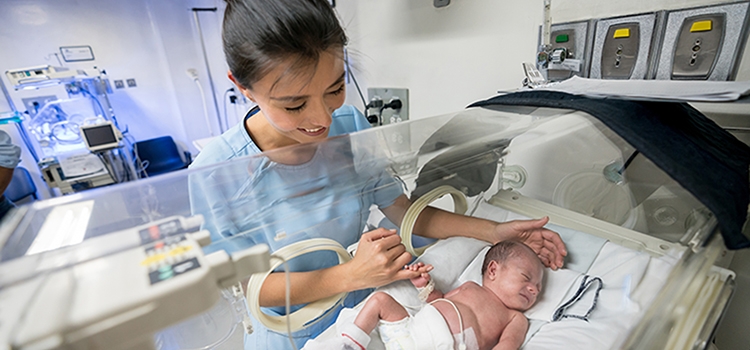Being a nurse is probably one of the most rewarding careers that there is, as it gives you the opportunity to work closely with your patients and make a real difference in their lives. Registered nurses also have a lot of opportunities to progress or even completely change their careers after they have qualified, specializing in a specific branch of medicine or even moving to a non-clinical role.
In this article, we’ll take a look at 10 of the best career options for nurses.
1. Neonatal nurse
Neonatal nurses work with infants who have been born prematurely or with a health condition which means that their health is at risk. Neonatal nurses are usually based in the NICU, and their role involves constant monitoring of patients to ensure their ongoing health.

They receive specialist training in techniques that are used on infants, such as intravenous transfusions, blood draws, and the administration of oxygen.
It’s a high-pressure role, but one that could also be highly rewarding if you are a person who enjoys working with children and their families. The current average salary for neonatal nurses is $65,000 per year, and the field is expected to keep growing.
2. Clinical nurse
Clinical nurses are advanced practice nurses, which means that they receive one of the highest salaries in the sector at an average of $110,778 per year. The role of a clinical nurse is to function both as a nurse, providing care to patients, but also as a leader for other nurses. This means that a clinical nurse often provides expertise on complex conditions and acts as a mentor to other nurses. They will work closely with patients and their families, providing advice on how to manage health conditions.
To become a clinical nurse, you must first have experience as a registered nurse. You can then get your advanced degree, and once you have this, you can go on to apply for your specialty certification.
3. Family nurse practitioner

A family nurse practitioner is a popular progression choice for nurses because it’s a role that allows a great deal more flexibility than other roles in the healthcare field. FNP’s are primary care providers, meaning that they carry out a role that is similar to a physician by diagnosing illnesses and recommending treatment options. In some states, nurse practitioners can work without needing to be supervised by a physician.
They often work in rural settings, allowing communities without good access to healthcare to benefit from their experience as a healthcare provider and a health educator. To qualify as a family nurse practitioner, you must first be a registered nurse with a BSN. You can then study for either your MSN or your DNP FNP, which gives you all you need to work as a nurse practitioner, plus management level skills.
4. Chief nursing officer
Chief nursing officers are responsible for the nursing care that is provided at a healthcare facility. They must have excellent leadership skills but also have a good analytical eye and the ability to predict healthcare and staffing needs.
Part of the role of a chief nursing officer is to be involved with the design of healthcare strategies that are designed to provide optimal care to patients while at the same time ensuring the healthcare facility can run effectively as a business.
They must also ensure that their facility remains compliant with government healthcare policies.
The average salary for a chief nursing officer is $133,000, but in some places, this could be as high as $204,000.
5. Clinical director
Clinical directors are responsible for the care that is provided in their facility. They must have a good understanding of what patients need and what the facility needs in order to run effectively. They must also be able to communicate this effectively across multiple different teams in their organization.
In large organizations, clinical directors will usually be responsible for a specific department, for example, surgery or physical therapy. In smaller organizations, the clinical director would be in charge of the whole organization.
The pay for clinical directors will vary according to where they are working, but according to the BLS, the average salary for a clinical director was $104,280 in May 2020.
6. Nurse advocate
A nurse advocate is someone who speaks up on behalf of patients to ensure that their rights and their quality of care are maintained. All nurses have a level of advocacy training within their role, so if this is something you find satisfying, then it could be a logical next step. Nurse advocates can act as a liaison between patients and care providers, between patients and insurance companies, or between patients and any other healthcare organization.
The purpose of the role is that patients can feel as though there is someone on their side, particularly in situations where they feel that they are being treated unfairly. The average salary for nurse advocates is $45,006 to $85,312 annually, but it’s also possible to act as an independent advocate and set your own salary.
7. Nurse educator
The role of a nurse educator is to train other nurses, and so it can be a great way to feel as though you are having a positive impact on the healthcare system as a whole. One good educator has the opportunity to train and inspire a lot of aspiring nurses!
Nurse educators can work in hospitals, universities, and businesses. Where you work will dictate your salary. Nurse educators working in junior colleges earn an average of $75,190 annually, whereas nurse educators teaching at a University or college can earn around $84,320. To work as a nurse educator, you will need to be a qualified RN with enough experience to pass on to your students.
8. Dialysis nurse
Dialysis nurses are registered nurses who specialize in dialysis, which means looking after patients who require dialysis because their kidneys are no longer functioning as they should.
Nurses who want to specialize in dialysis will need to get their BSN and be working as a registered nurses. They can then specialize in dialysis by undertaking courses in that area and requesting that their employer help them to build experience.
The average salary for dialysis nurses is $64,000.
9. Psychiatric mental health nurse

Psychiatric mental health nurses specialize in looking after patients with psychiatric disorders. They might work in a hospital or a specialist mental health facility. In order to become a psychiatric mental health nurse, you must first be a registered nurse, and you must have an ADN degree at a minimum (a BSN is preferable).
10. School nurse
School nurses are responsible for educating children about how to maintain good health and are also there to provide health advice to children as and when they need it. They will also respond to any medical emergencies that occur within the school. The average salary for a school nurse is $46,350.


